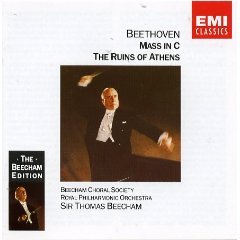| All Artists: Beethoven, Beecham, Rpo Title: Mass in C Members Wishing: 0 Total Copies: 0 Label: EMI Release Date: 11/10/1992 Genre: Classical Styles: Opera & Classical Vocal, Historical Periods, Classical (c.1770-1830), Modern, 20th, & 21st Century Number of Discs: 1 SwapaCD Credits: 1 UPC: 077776438528 |
Search - Beethoven, Beecham, Rpo :: Mass in C
CD Details |
CD ReviewsBEETHOVEN THE BEAUTIFUL DAVID BRYSON | Glossop Derbyshire England | 01/18/2004 (5 out of 5 stars) "Beecham was not wholly in sympathy with the spirit of Beethoven, as he was not with Bach or Brahms either. The third movement of the seventh symphony he described as being `like a lot of yaks jumping about', an image that is hard to dispel from the mind. Moreover Beecham was thoroughly irreligious by temperament, so he might not seem, on first thoughts, to be the interpreter one would think to turn to for an outstanding performance of Beethoven's Mass in C.Such reasoning would be quite mistaken, it seems to me. The Mass in C has always been in the shadow of its great successor the Missa Solemnis, and such commentary as it has received from the recognised pundits has sometimes been oddly off-beam. Donald Francis Tovey, normally Beethoven's vicar on earth who can find miracles in the most ordinary devices provided they are the work of Beethoven, describes the Mass in C as `not very interesting', an assessment that I can make no sense of at all. Even by comparison with the Missa Solemnis, let alone in its own right, the Mass in C seems to me a masterpiece - maybe a lesser one, but much more even in quality. The fugues in the usual places at the end of the Gloria and the Credo are good middle-period Beethoven fugues without the ill-judged (to my way of thinking) attempts to take on Handel that spoil their corresponding sequences in the Missa Solemnis. Taken just for itself, the Mass in C seems to me one of the outstandingly successful products of Beethoven's middle period - confident, assured, original, innovative and more than anything else unfailingly beautiful, entirely free of the occasional inconsistency and near-incoherency that were all part of that stage of the great man's spiritual progress. This account of the work is another unmissable monument to the greatest conductor, I believe, of the 20th century. That said, the recording can't be expected to be up to the most-to-date standards, and there is a certain sense of strain in the high notes from both soloists and chorus, although I noticed that the very deep bass notes at `et sepultus est' came across extremely effectively. The soloists are good but not `outstanding' in the way one might look for that quality in Verdi's Requiem, and this should give nobody any problem as these are not `star' solo parts as they are in that supernova of a composition. I feel no inclination to subject this performance to plodding comparisons with modern versions. This is the work of one kind of visionary interpreting another, and a lot of the fascination for me comes from the very fact that their visions were so utterly dissimilar. One expects a combination of power with grace from Beecham, one expects it when one gets it from Beethoven. The easy flow and continuity, and the strength, suppleness and shapeliness that were the hallmarks of whatever Beecham did are here in his Beethoven as surely as in his Berlioz, Bizet or Balakirev. Even quite late in his career Beethoven was still turning out the occasional lesser achievement. The Ruins of Athens, predicated on the sycophantic concept that the goddess Pallas Athene slept for two thousand years and awoke to find the glories of Periclean Athens recreated in Budapest in 1812 by no means shows what Beethoven could do, but it shows what Beecham can do with composers' lesser efforts."
|

